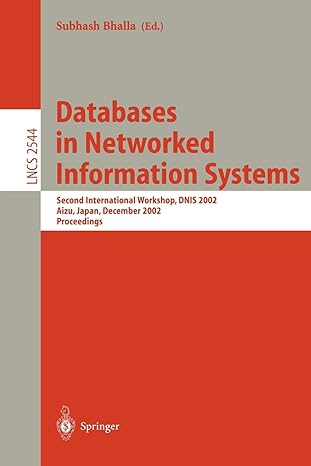Question
In Python Background Info: Imagine a circle inscribed within a square that spans the area where -1 ? x ? 1 and -1 ? y
In Python
Background Info:
Imagine a circle inscribed within a square that spans the area where -1 ? x ? 1 and -1 ? y ? 1. The area of the inscribed circle, whose radius is 1.0 would be ?.
If you were to throw darts at random locations in the square, only some of them would hit inside the circle inscribed within it. The ratio
area of the circle ------------------ area of the square
can be estimated by the ratio
number of darts that hit inside the circle ------------------------------------------ total number of darts thrown
As the number of darts increases, the second ratio, above, gets closer and closer to the first ratio. Since three of the four quantities involved are known, they can be used to approximate the area of the circle this in turn can be used to approximate ?
Functions to write
For this problem, you will write two functions (each based on loops) that use different tests for determining how many random darts to throw: forPi(n) and whilePi(error). One of the common elements of the two functions is to determine if a dart hits within the circle. Because the dart is thrown randomly, we need to use random numbers we learned earlier in the semester. You will need to import the random number package, you will also need to use the uniform() random function to determine if a pair of x and y (coordinates where the dart hits) is within the circle.
Task #1 : forPi
The forPi(n) function takes in a positive integer n and should throw n darts at the square. Each time a dart is thrown, this function should print
the number of darts thrown so far
the number of darts thrown so far that have hit inside the circle
the resulting estimate of ?
Return value The forPi function should return the final resulting estimate of ? after n throws.
Task #2: whilePi
The whilePi(error) function, on the other hand, will take in a positive floating-point value, error, and should then continue to throw darts at the dartboard (the square). It should only stop when the absolute difference between the estimate of ? and the real value of? is less than error.
As with the forPi function, this function should print
the number of darts thrown so far
the number of darts thrown so far that have hit inside the circle
the resulting estimate of ?
after each dart throw it makes.
Step by Step Solution
There are 3 Steps involved in it
Step: 1

Get Instant Access to Expert-Tailored Solutions
See step-by-step solutions with expert insights and AI powered tools for academic success
Step: 2

Step: 3

Ace Your Homework with AI
Get the answers you need in no time with our AI-driven, step-by-step assistance
Get Started


